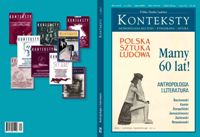Doświadczenie kolażu. Archiwum Leopolda Buczkowskiego
The Collage Experiment. The Leopold Buczkowski Archive
Author(s): Agnieszka Karpowicz Subject(s): Anthropology
Published by: Instytut Sztuki Polskiej Akademii Nauk
Keywords: anthropology; Leopold Buczkowski; Konteksty
Summary/Abstract: The ”ephemera of memory” comprise a category constitutive for the works of Leopold Buczkowski. Punctualistic, aleatoric non-fiction constructions create museum space in which the author tries to revive ”Rusin words-sounds”, i. e. the living, dialogical and multicultural vernacular of pre-war Podolia. His stories, however, progress more in time than in space by creating simultaneously overlapping strata of myriad versions of events, myths, and imagery, enrooted in collective imagination. The homophonic quality of the ephemera corresponds to the fleeting nature of human memory. With attempts at capturing living speech and music as his point of departure, Buczkowski arrived at decontextualised records or even written down conversation when, for instance, he creates narration composed of quotations from Polish-French phrase-books. Only decontextualisation, characteristic for the written word, is regarded by the author as a tool suitable for building a memory museum; he thus endeavours to create an archive of forms no longer existent after the Second World War, in this way salvaging a dying world and chronotypes doomed to oblivion. By setting up an archive of past forms of culture and art Buczkowski also conducts an in-depth analysis of modern culture based on the bourgeois ethos and writings which he holds responsible for the catastrophe of the Second World War. In the ”museum of memory” writing has assumed the shape of archaeology, i. e. the extraction of the relics and forms of a vanishing world from oblivion. This is the reason why narration brings to mind a collection. It remains specific because its medium is the printed word. Just as in collections of objects, it constitutes an attempt at reaching, via material (here: the letter, the visible sign of writing), that which is invisible and impalpable – forms of a world which perished in World War II. The instruments applied by the author are close to the techniques of twentieth-century art which also frequently turns into archaeology by gathering actual objects and the debris of contemporary civilisation. Prose by Buczkowski resembles a visual art collage, an assemblage executed with the help of the recycling technique.
Journal: Konteksty
- Issue Year: 2007
- Issue No: 01
- Page Range: 17-40
- Page Count: 24
- Language: Polish
- Content File-PDF

